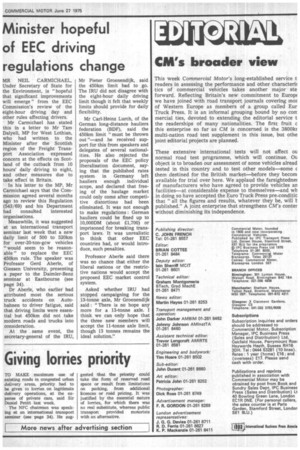Minister hopeful
Page 7

If you've noticed an error in this article please click here to report it so we can fix it.
of EEC driving
regulations change
MR NEIL CARMICHAEL, Under Secretary of State for the Environment, is "hopeful that significant improvements will emerge" from the EEC Commission's review of the eight-hour driving day and other rules affecting drivers.
• Mr Carmichael has stated this in a letter to Mr Tam Dalyell, MP for West Lothian, who had written to the Minister after the Scottish region of the Freight Transport Association expressed concern at the effects on Scotland of the cutback from 10 hours' daily driving to eight, and other measures due to take effect in Britain.
In his letter to the MP, Mr Carmichael says that the Commission agreed several months ago to review this Regulation (543/69) and his Department had consulted interested organisations.
Meanwhile, it was suggested at an international transport seminar last week that a new daily limit of 500 to 520km for over-20-ton-gcw vehicles "would seem to be reasonable" to replace the EEC 450km rule. The speaker was Professor Gerd Aberle, of Giessen University, presenting a paper to the Daimler-Benz seminar at Eastbourne (see page 34).
Dr Aberle, who earlier had attributed most the serious truck accidents on Autobahnen to driver fatigue, said that driving limits were essential but 450km did not take modern roads and trucks into consideration.
At the same event, the secretary-general of the IRU, Mr Pieter Groenendijk, said the 450km limit had to go. The IRU did not disagree with the eight-hour daily driving limit though it felt that weekly limits should provide for daily flexibility.
Mr Carl-Heinz Lurch, of the German long-distance hauliers federation (BDF), said the 450km limit "must be thrown out "—and he received support for this from speakers and delegates of several nationalities. He also rejected the proposals of the EEC policy liberalisation document, saying that the published rates system in Germany left hauliers enough individual scope, and declared that freeing of the haulage market could only come after competitive distortions had been eliminated. It was not enough to make regulations : German hauliers could be fined up to 10,000DM (about £1,700) or imprisoned for breaking transport laws. It was unrealistic to think that other EEC countries had, or would introduce, such penalties.
Professor Aberie said there was no chance that either the liberal nations or the restrictive nations would accept the proposed EEC market control system.
Asked whether IRU had stopped campaigning for the 13-tonne axle, Mr Groenendijk said : "There is no hope any more for a 13-tonne axle. I think we can only hope that the three new members will accept the 11-tonne axle limit, though 13 tonnes remains the ideal solution."




















































































